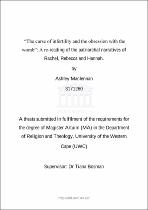“The curse of infertility and the obsession with the womb”: A re-reading of the patriarchal narratives of Rachel, Rebecca and Hannah
| dc.contributor.advisor | Bosman, Tiana | |
| dc.contributor.author | Maclennan, Ashley | |
| dc.date.accessioned | 2022-03-15T12:19:34Z | |
| dc.date.available | 2022-03-15T12:19:34Z | |
| dc.date.issued | 2021 | |
| dc.identifier.uri | http://hdl.handle.net/11394/8892 | |
| dc.description | Magister Artium - MA | en_US |
| dc.description.abstract | When one reads about women in the Old Testament, their primary- and often only- roles seem to be that of wife and mother. It is made abundantly clear in some of the narratives found in the Old Testament that a woman’s worth was tied to her womb. The stories of Rebekah, Rachel and Hannah are three examples of this. However, there are some women in the narratives of the Old Testament, including these three, who were initially incapable of falling pregnant and only conceived after a long time of intense struggle due to their infertile state. Barren women were viewed as outcasts in society. Some women, however, were not willing to settle for this classification. Hence, Hannah pleaded with God to provide her with offspring. | en_US |
| dc.language.iso | en | en_US |
| dc.publisher | University of Western Cape | en_US |
| dc.subject | Infertility/barrenness | en_US |
| dc.subject | Womb | en_US |
| dc.subject | Patriarchy | en_US |
| dc.subject | Matriarchy | en_US |
| dc.subject | Curse | en_US |
| dc.title | “The curse of infertility and the obsession with the womb”: A re-reading of the patriarchal narratives of Rachel, Rebecca and Hannah | en_US |
| dc.rights.holder | University of Western Cape | en_US |

